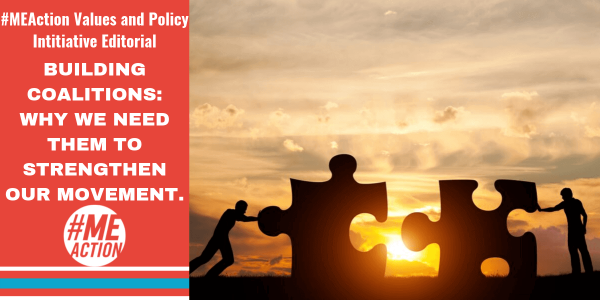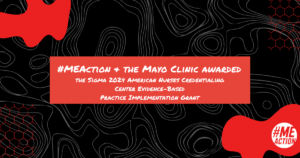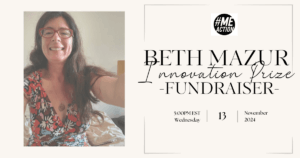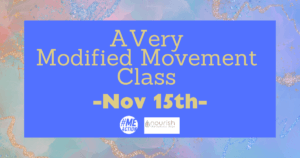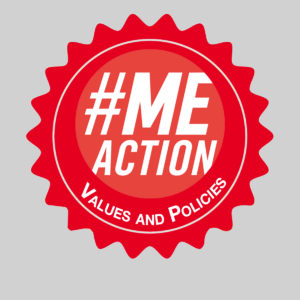
Values & Policy Initiative
This article is part of our Values & Policy Initiative, a six-month long process for the community to come together to learn and discuss our core values, tactics and positions so that we are more unified in our work as a large, diverse community. This process will culminate in a statement of principles and values as well as a formal policy platform, which the community will ratify with an up-or-down vote. Visit our Values & Policy webpage to see published articles, and our timeline for discussion. #MEActionVPI
Join our upcoming Community Call to discuss our values and tactics on Wednesday, October 30th at 10 am PT / 1 pm ET / 6 pm UK
Our community cannot fight for recognition and change in a vacuum. We need to build partnerships with groups whose missions and values align with our own, who are already committed to addressing the injustices, neglect and stigmatization affecting communities overlapping with ours.
In addition, we must strengthen our lobbying power by building coalitions with other disease groups facing similar struggles to press for widespread and urgent change from our government and the medical community.
In my experience working with various ally organizations to advocate for myalgic encephalomyelitis (ME) research and recognition, I have seen three main ways in which coalitions effectively support the ME community.
- Creates awareness: Outreach to outside organizations spreads more widely awareness of ME, and educates other communities, who usually know nothing about ME, allowing them to write and publish articles to their membership with our input.
- Builds lobbying power. Building coalitions with other organizations means that more people act as advocates for ME before Congress, the National Institutes of Health, the Center for Disease Control and Prevention and the Federal Drug Administration.
- Widens our base for fundraising by widening our network of supporters beyond the ME community.
Here are some examples of success from my own experience working to build coalitions for people with ME:
National Organization of Women (NOW)
While ME is not a women’s disease, it is a women’s issue. The disbelief and stigma surrounding women’s health has directly contributed to the medical community’s dismissal and neglect of the ME crisis. ME also affects a large number of women.
(To understand more about the dismissal of women by the medical and research communities, read the book by author, Maya Dusenbery, who presents example after example of disbelief, neglect and mistreatment of women by the medical and research communities across a variety of diseases, including ME. Dusenbery’s book is called, “Doing Harm: The Truth About How Bad Medicine and Lazy Science Leave Women Dismissed, Misdiagnosed, and Sick,” and includes a chapter about ME.)
NOW is the largest organization of feminist activists in the U.S. with 550 chapters across all 50 states. NOW’s national office has been supportive of various initiatives for myalgic encephalomyelitis/chronic fatigue syndrome (ME/CFS). The National NOW office wrote a supportive detailed letter to Congress and all the governmental agencies we suggested to them in support of requests to these governmental groups, including asking for a line item in the budget.
We had an overwhelmingly positive response at the NOW national conference in July, 2018 in several ways.
- Jen Brea was awarded the Victoria J. Mastrobuono Award for Women’s Health.
- A panel discussion was held about gender bias in medicine that focused on the health crisis of ME, and included three people with ME on the panel.
- The NOW membership at the conference voted to approve a resolution for diseases and conditions affecting large numbers of women, including ME. Read more. Women attending the conference all knew of someone – or themselves – who were suffering from autoimmune illnesses, endometriosis, ME and a large host of other diseases. The resolution was easily voted in.
NOW can help us connect to other leaders of women’s organizations to further our advocacy work. NOW is open to hearing from us about future actions they can participate in.
Hadassah: (A Jewish Women’s Organization with 330,000 members)
Two years ago, Hadassah created the Hadassah Coalition for Equity in Women’s Health. Several ME advocates met with Hadassah national staff in person and on the phone. The staff were very responsive. They sent a professional reporter to write a very good article about ME, which was published in their widespread monthly magazine. Read here.
Hadassah also invited a person with ME as one of their three speakers at their 2nd conference – the Women’s Health Empowerment Summit – in May of 2018. The speaker, Kathryn Fox, received a standing ovation. Several people are now meeting with Hadassah about future ventures, as Hadassah has just set up a new legislative office in Washington, DC.
How YOU can help build coalitions
I have primarily reached out to women’s organizations because I have a long history as a feminist. However, many of us belong to groups, or once belonged to groups, such as religious groups or civic groups, which we can connect to raise their awareness about the ME health crisis, and solicit their support in advocating for people with ME.
Is there an organization that you would like to reach out to? We can help make that happen. Contact our FFAME group at [email protected].
Visit our Values & Policy webpage to read published articles, see the timeline for discussion and join community calls. #MEActionVPI
About the author: Bobbi Ausbel is the mother of a daughter who has had ME for 28 years. Bobbi is actively engaged in advocacy work with several organizations, and through her own initiatives. As part of #MEAction, Bobbi co-founded the Family Friends & Allies of ME (FFAME) support group, and is involved with the Caregivers support group. She was one of the core organizers for two #MillionsMissing demonstrations in San Francisco. She serves as a Community Ambassador for the Open Medicine Foundation, working to fundraise for research.



